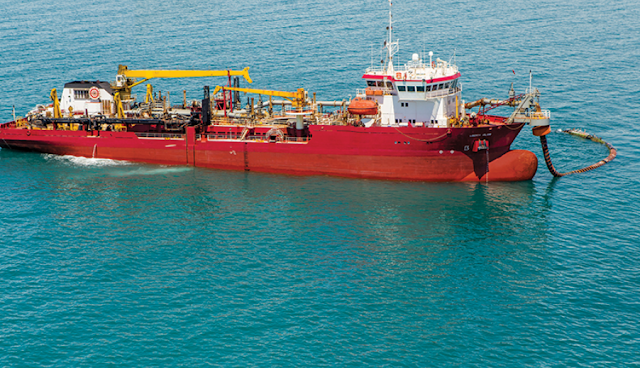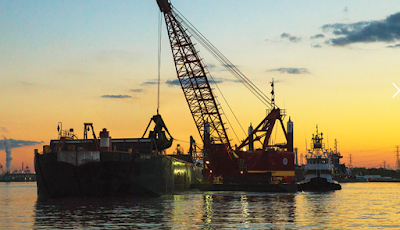

A map from an enviornmental assessment showing the pipelines that criss-cross the area on and around Chenier Ronquille Island at the southern end of Barataria Bay. The island is being restored with money from BP's Deepwater Horizon oil spill natural resources damage assessment. Workers restoring the island accidentally cut one of the pipelines, causing a spill of 5,250 gallons of oil. (NOAA National Marine Fisheries Service)
By Mark Schleifstein, NOLA.com | The Times-Picayune
on September 07, 2016 at 7:00 AM, updated September 07, 2016 at 9:47 AM
It's one of those ironies that Louisiana may have to get used to: the 5,250-gallon spill of crude oil discovered Monday in Bay Long, part of Barataria Bay, was caused by a contractor working on a project aimed at restoring the effects of the BP oil spill, federal officials confirmed Tuesday (Sept. 6).
An excavating marsh buggy operated by Great Lakes Dredge & Dock Co. accidentally cut through a pipeline, releasing the oil, whil e rebuilding Chenier Ronquille Island on the edge of Bay Long, part of the southern edge of Barataria Bay.
Dredge hits pipeline in coastal Jefferson Parish
A containment boom was deployed to stop the spread of the oil.
The pipeline is owned by Harvest Pipeline Co., an affiliate of Houston-based Hilcorp Energy. This is just the latest problem involving oil spills or dredging for Hilcorp in recent weeks, including a 4,200-gallon spill of crude reported on July 26 from an abandoned flow line owned by the company near Lake Grande Ecaille, also part of Barataria Bay.
And the company is also fighting a lawsuit filed in June by the Louisiana Oysterman Association, charging it with smothering oyster leases in the bay by dredging access channels to one of its wells.

Amid latest oil spill, Hilcorp Energy targeted by oyster growers
Sediment from running tug propellers through West Bank wetlands smothered oyster beds, federal lawsuit says
The $36 million barrier island reconstruction project involved in Monday's accident is funded by part of the $1 billion that BP made available for early Natural Resource Damage Assessment projects a year after the Deepwater Horizon oil rig caught fire and sank in April 2010, releasing millions of barrels of oil into the Gulf.
The project is being overseen by the National Oceanic and Atmospheric Administration, one of six federal agencies named as trustees in the response to the spill. The Chenier Ronquille project was originally authorized in 2010 as part of the federal-state Coastal Wetlands Planning, Protection and Restoration Act project, and is and part of a federal-state plan to rebuild all the barrier islands at the southern end of Barataria Bay. The work includes repairing breaches in the shoreline, reconstruction of dunes and marsh creation.
The environmental assessment prepared for the original CWPPRA project warns that oil and gas pipelines are found throughout the project area.
"Dredging and associated activities can affect pipelines if the dredging crosses an active pipeline," the assessment said. "Multiple surveys to identify potential areas of pipelines, correspondence with pipeline owners and landowner searches are conducted so this can be avoided by selecting an access route with the least potential to cross pipelines. The access channel for the back dike (primary dike) was carefully selected in this manner. Pipelines lie on either side and inspectors and contractors would take care to observe safety buffer zones around the located pipelines as well as any crossings."
On Tuesday, the Coast Guard, Louisiana Oil Spill Coordinator's Office and ECM Maritime Services established a "unified command" to respond to the discharge.
"The damaged pipe is isolated. Response crews are determining the best way to safely remoe the remaining product from the line," said a news release issued by the Coast Guard. The release did not say how much oil remained in the pipeline.
The release said 74 personnel, 21 boats, eight skimmers and about 10,000 feet of hard boom had been deployed to contain and recover the spilled oil. About 560 gallons of oil and water mixture had been recovered so far.
Aerial assessments are being conducted of the site and surrounding area to guide response efforts, the release said.
The Louisiana Department of Wildlife and Fisheries reported two oiled birds in the area, and the state Department of Environmental Quality is conducting a shoreline impact assessment. Individuals seeing impacted wildlife should call 713.705.5897.
The cause of the pipeline break is still under investigation, the news release said.
===========
Unified Command established for Louisiana oil spill response
The damaged pipeline is isolated. Response crews are determining the best way to safely remove the remaining product from the line.
To date, 74 personnel, 21 boats, 8 skimmers, and approximately 10,000 feet of hard-boom have been deployed to contain and recover the product. Approximately 560 gallons of oily-water mixture have been recovered.
Aerial assessments are being conducted of the site and surrounding areas to guide response efforts.
The Louisiana Department of Wildlife and Fisheries has reported two oiled birds in the area. Louisiana Department of Environmental Quality is conducting shoreline impact assessment. To report impacted wildlife, call 713-705-5897.
On Monday, an estimated 5,300 gallons of crude oil was discharged from a Harvest Pipeline Company pipeline after a Great Lakes Dredge and Dock Company vessel conducting excavation operations struck it.
The cause of the incident is under investigation.
=================
Coast Guard responds after dredge strikes pipeline in Louisiana
Sep 5th, 2016
Watchstanders at Coast Guard Sector New Orleans received a report at 10:09 a.m. that approximately 5,300 gallons of crude oil leaked from a pipeline own by Harvest Pipeline Company after it was struck by a Great Lakes Dredge and Dock Company vessel that was conducting excavation operations.
The pipeline is reported as secured.
ECM Maritime Services, an oil spill response organization, has been contracted Great Lakes Dredge and Dock company to manage clean-up operations. An Incident Command Post is being established in Grand Isle to manage response operations.
Environmental Safety & Health has deployed approximately 3,000 feet of hard-boom. OMI Environmental Solutions and Clean Gulf Association are using sorbent material and skimmers to collect the oil. The Coast Guard and Louisiana Department of Wildlife and Fisheries are also overseeing the response.
Coast Guard Air Station New Orleans aircrews have conducted aerial assessments of the site and surrounding areas.
The cause of the incident is under investigation.
=========
Dredge hits coastal Jefferson Parish pipeline, Coast Guard reports
The U.S. Coast Guard reported a dredging company hit a pipeline Monday afternoon (Sept. 5, 2016) in coast Jefferson Parish, leading to the release of about 10 barrels of oil. (Google Maps)
By Maria Clark, NOLA.com | The Times-Picayune
on September 05, 2016 at 5:28 PM, updated September 05, 2016 at 8:59 PM
A pipeline struck by a dredging company Monday afternoon (Sept. 5) about 12 miles from Grand Isle has been secured, according to the U.S. Coast Guard.
The accident in Bay Long, which is about 12 miles east of Grand Isle, resulted in the spill of about 5,300 gallons of crude oil into the water.
The Illinois-based company, Great Lakes Dredge and Dock, provides marine dredging and engineering services according to their website. There was no immediate response to an email and phone call to the company. The pipeline is owned by the Harvest Pipeline Co.
ECM Maritime Services, an oil spill response organization, has been contracted Great Lakes Dredge and Dock company to manage clean-up operations. A command post is being established in Grand Isle to manage response operations.
OMI Environmental Solutions and Clean Gulf Association are using absorbent material and skimmers to collect the oil. A containment boom, which operates as floating barrier, was deployed to stop the spread of the oil. The Coast Guard and Louisiana Department of Wildlife and Fisheries are also overseeing the response.
The cause of the incident is still under investigation.
This story has been updated with new information on response efforts.











